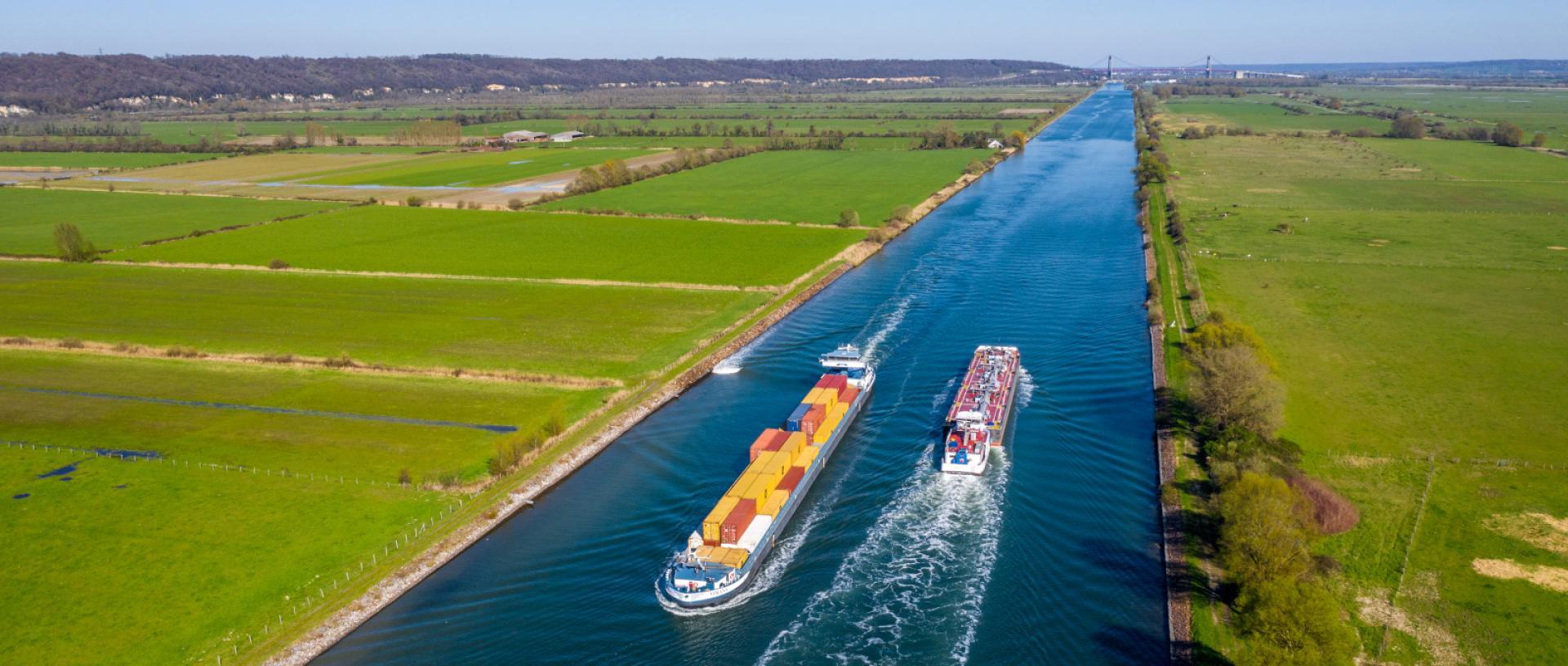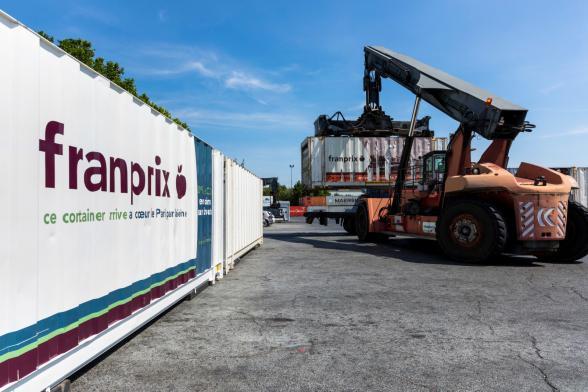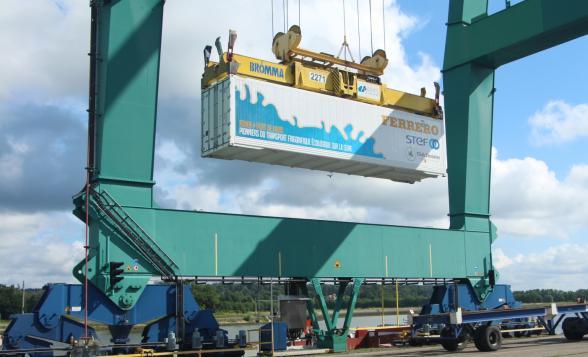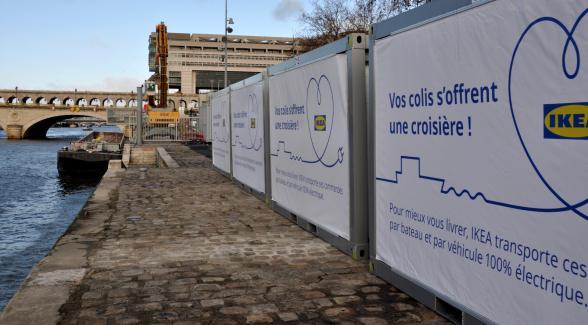- ABOUT US
- GOODS
- A multi-sector focus
- A maritime service offering in the first rank
- An attractive multimodal offering
- An expanded shortsea service offering
- Terminaux portuaires et quais à usage partagé
- High-quality ship services
- Fluid, facilitated goods throughput
- A port that puts its performance figures in the public domain
- PASSENGERS
- MULTIMODALITY
- ECOLOGICAL TRANSITION
- INNOVATION
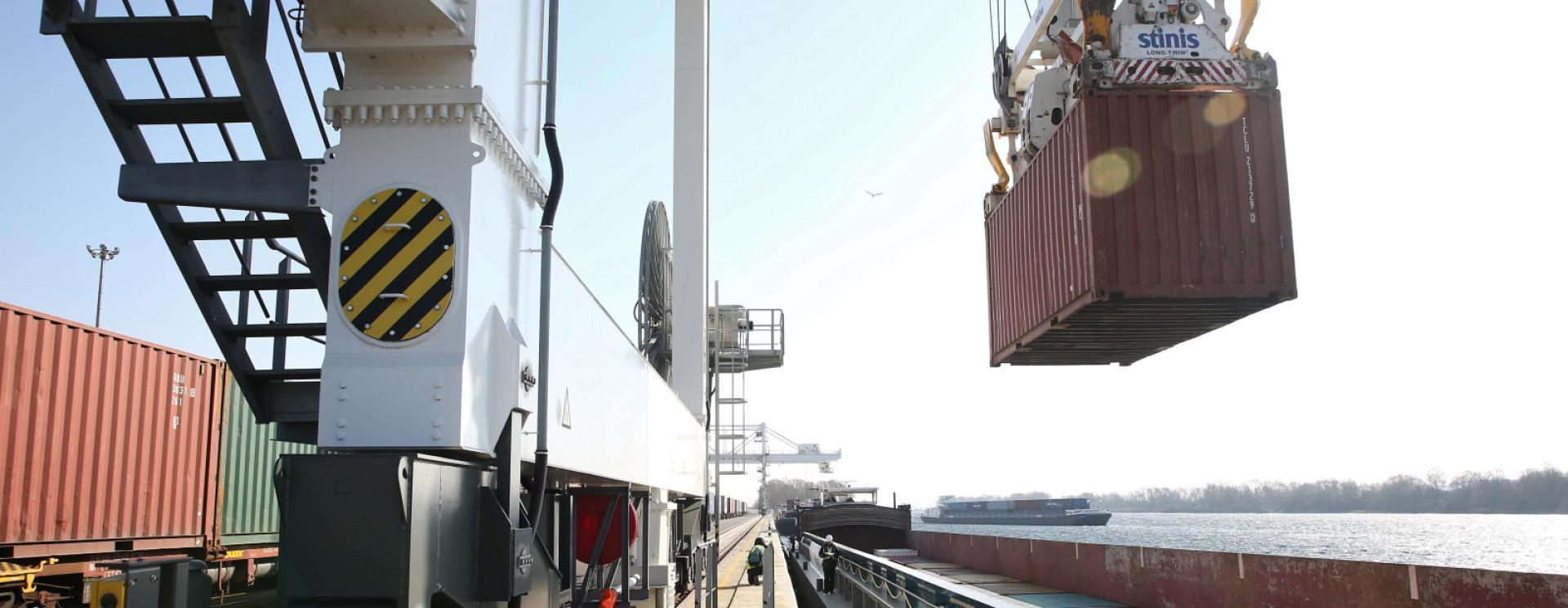
Reliable, economic and ecological river transport services
Published on - Updated
The river mode is particularly well suited to all types of goods: containers (20’, 40’, 45’Pallet Wide (PW), reefer, mobile crates), heavy and oversized packages, as well as liquid and solid bulk (construction industry loads, recyclable products, agroindustry, including grain, etc.).
It also has numerous benefits where sustainable development is concerned: low energy consumption and lower levels of greenhouse gas emissions per tonne-kilometre carried.
The Seine, a natural asset for HAROPA PORT, enables France’s premier port to provide a supply chain that is fast, economic and sustainable for carrying all your goods in France and in Europe. Over 40% of French river tonnage travels via the Seine.
HAROPA PORT’s river service offering means:
Provision of a comprehensive range of river-based services…
competitive:
massification of freight volumes, advantages for customs formalities thanks to rail-connected terminal installations and Approved Economic Operator (AEO) status for the majority of the terminals and their operators, as well as generous parking allowances.
- secure :
- secure inland terminals,
- river transport is conducted in the best possible conditions of safety and security, eliminating the constraints and risks associated with road transport.
- sustainable :
- reduction of road congestion and noise pollution,
- 5 times less CO2 and 4 times less energy consumed than road freight .
- regular and reliable:
- about twenty waterway round-trips per week to ten destinations along the Seine axis,
- regular services for bulk traffic,
- network with no congestion: 99.5% = river availability rate (navigation/infrastructure from Le Havre to Bonneuil-sur-Marne),
- 100% punctuality with movements possible 24/7/365.
- adaptable et flexible :
- des transit times garantis permettant des solutions de livraison flexibles (nuit, week-end) ;
la proximité des terminaux intérieurs avec les marchés pour une livraison rapide et donc gain de temps ;
- simple : a single interlocutor from end to end of the supply chain.

… and associated solutions
1. for navigation assistance
Available on the Internet since 2019, « SIF Seine », the river information service, is a resource for assisting navigation for use by carriers of freight and passengers. This application, whose purpose is to optimise river navigation, can provide a wide range of information such as water levels, bridge clearance heights, availability of facilities, waterway traffic, and more.
Partner : Voies navigables de France
2. Quayside power
Together with Voies Navigables de France (VNF), the port is offering freight and river cruise vessels water and power supply terminals as part of the Borne&Eau programme. The first terminals have already been installed with VNF in Le Havre, Rouen, Conflans-Sainte-Honorine, Poses-Amfreville and Gennevilliers for freight, and in the ports of Grenelle, La Tournelle, Boulogne-Legrand, Javel and La Roche-Guyon for cruises.
In 2024, HAROPA PORT has also installed 36 additional freight bollards and one dedicated to cruise ships in the port of Javel-bas.
The work begun with VNF is continuing and will bring the total number of bollards for freight boats to 96, and 36 for river cruises.
This service, which is supported by the European Union through the European Interconnection Facility, and in part by the Ile-de-France Region, reduces atmospheric emissions linked to the use of auxiliary engines to supply electricity for life on board when the boats are docked, noise and odour pollution for local residents and boatmen, and fuel and maintenance requirements.
They have placed their trust in us
Franprix
Since 2012, 300 stores have been supplied via the river by a daily barge service carrying 45 mobile crates between the ports of Bonneuil-sur-Marne and La Bourdonnais.
Environmental benefits: 4,000 fewer trucks on the roads every year, 234 tonnes of CO2 emissions avoided, along with 23% Nox, 46% CO, 43% hydrocarbons and nearly 90,000 litres of diesel saved.
Ferrero
Opened a river goods transport service on the Seine Axis from Rouen port to Gennevilliers in July 2021. This system is based on weekly delivery of 22 pallets of confectionery to Monoprix’ Wissous warehouse.
This new service enables a reduction from 54 to 19 trucks and the transfer of 65% of all journeys to multimodal transport. Plus a saving of a little over 5 tonnes of CO2/year.
IKEA
In 2021, IKEA France once again showed its trust in HAROPA PORT by developing plans for a new logistics warehouse at the port of Limay-Porcheville. Using this new distribution centre, the Swedish firm has set a goal of developing sustainable logistics in close proximity to the Paris consumer area based on implementation of an urban river shuttle. Starting in 2022, IKEA has put in place an urban river logistics offering coupled with electric vehicle service for final delivery between the port of Gennevilliers and its Paris city stores.
